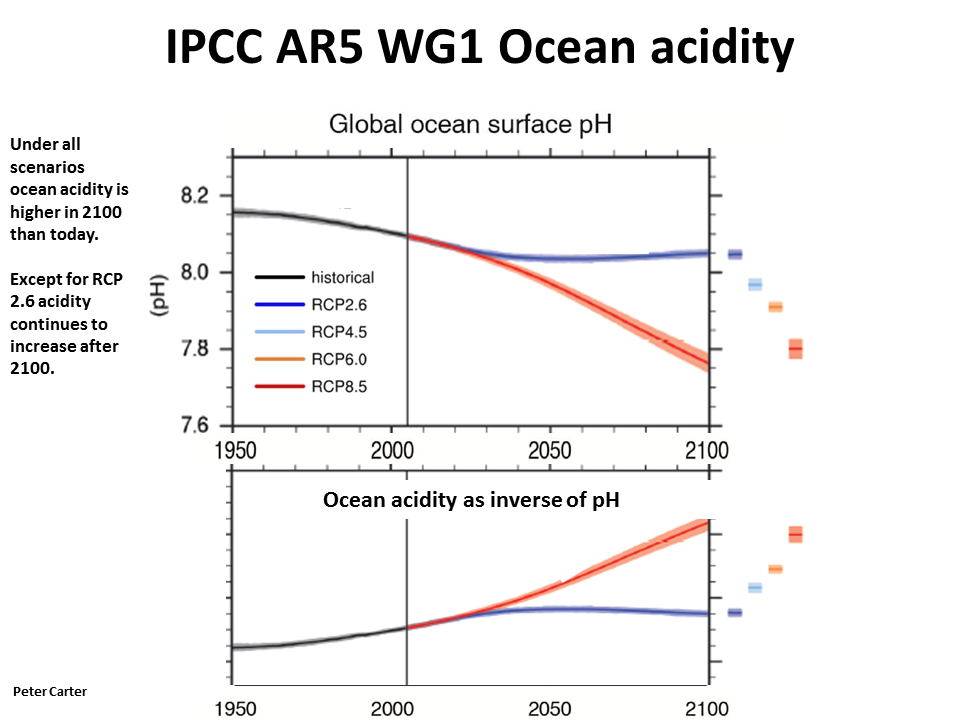Ocean Acidification

2009 Monaco Declaration by scientists on ocean acidification
2011 IPCC Workshop on Impacts of Ocean Acidification on Marine Biology & Ecosystems
January 2011 Okinawa, Japan
January 2011 Okinawa, Japan


Nov 2015 VIDEO Rapidly acidifying southern ocean waters (good explanation of ocean acidification)
3 Nov 2015 Abrupt changes in food chains predicted as Southern Ocean acidifies fast: study
2010 Paleo-perspectives on ocean acidification Carles Pelejero
Each unit on the pH scale represents a tenfold inverse change in acidity.
Feb 2016 Sea Change: the Pacific's perilous turn
Prior to industrialization, the concentration of carbon dioxide in the atmosphere was 280 parts per million (ppm). With increased use of fossil fuels, that number is now over 400 ppm and the growth rate is accelerating. Scientists calculate that the ocean is currently absorbing about one quarter of the CO2 that humans are emitting. When CO2 combines with seawater, chemical reactions occur that reduce the seawater pH. pH is the measure of relative alkalinity and acidity.
Seawater has a pH of 8.2 on average because it contains naturally occurring alkaline ions that come primarily from weathering of continental rocks. When seawater absorbs carbon dioxide from the atmosphere, carbonic acid is produced surface ocean pH has decreasedThe average pH of ocean surface waters has fallen by about 0.1 units, from 8.2 to 8.1, since the beginning of the industrial revolution. This corresponds to a 26% increase in acidity. This makes ocean acidification today the highest in over 20 million years.
Because the pH scale is logarithmic (a change of 1 pH unit represents a tenfold change in acidity), this change represents a 26 percent increase in acidity over roughly 250 years, a rate that is 100 times faster than anything the ocean and its inhabitants have experienced in tens of millions of years and soon the fastest in 300 million years.
Seawater has a pH of 8.2 on average because it contains naturally occurring alkaline ions that come primarily from weathering of continental rocks. When seawater absorbs carbon dioxide from the atmosphere, carbonic acid is produced surface ocean pH has decreasedThe average pH of ocean surface waters has fallen by about 0.1 units, from 8.2 to 8.1, since the beginning of the industrial revolution. This corresponds to a 26% increase in acidity. This makes ocean acidification today the highest in over 20 million years.
Because the pH scale is logarithmic (a change of 1 pH unit represents a tenfold change in acidity), this change represents a 26 percent increase in acidity over roughly 250 years, a rate that is 100 times faster than anything the ocean and its inhabitants have experienced in tens of millions of years and soon the fastest in 300 million years.
2017 BIOACID Largest study ever show ocean acidification along with other ocean effects of atmospheric CO2 pollution puts practically all marine life at risk.
Nov 2017 IUCN Ocean acidification brief (10X faster than past 300 million years)
Nov 2017 IUCN Ocean acidification brief (10X faster than past 300 million years)
Japan Met data site Ocean acidification in the western North Pacific

Climate Emergency Institute
Arctic Ocean Acidification: pelagic ecosystem and biogeochemical responses during a mesocosm study.Special issue of Biogeosciences, 2013
Sea Change: Ocean acidification, the lesser-known twin of climate change, threatens to scramble marine life on a scale almost too big to fathom - an excellent interactive multi-media primer on ocean acidification by The Seattle Times
Double click here to edit this text.